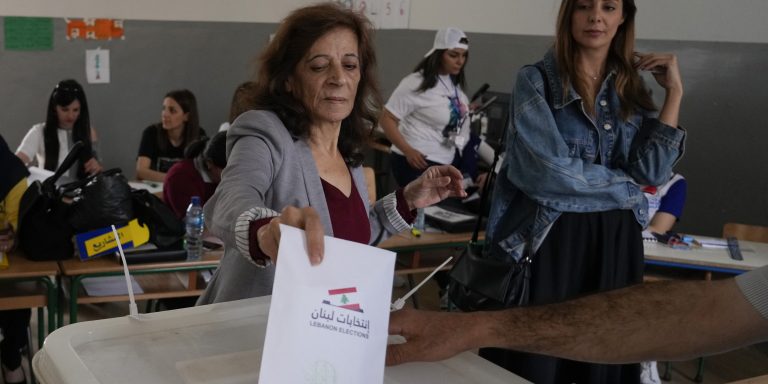INTELBRIEF
May 17, 2022
IntelBrief: Lebanon Election Shakes Up Political Landscape

Bottom Line up Front
- The May 15 parliamentary elections in Lebanon produced significant political realignments, even if they did not remake the sectarian-based political system.
- The message of the Lebanese Forces, a Christian faction, that Lebanese Hezbollah’s powerful militia should be disarmed appeared to resonate with many voters.
- The election showing of the Lebanese Forces and independent political newcomers appear to have deprived Hezbollah and its allies of a majority in the 128-seat body.
- The outcome of the election will have ripple effects on the foreign policies of major regional adversaries Iran and Saudi Arabia, as well as that of the United States, toward Lebanon.
On May 15, Lebanon’s citizens concluded voting for a new 128-seat parliament. The elections, which included ten days of voting by Lebanese abroad, are significant, because the elected parliament selects a president, who by longstanding agreement is a Maronite Christian. The president must also obtain parliamentary approval for a Prime Minister, who is to be a Sunni Muslim. The parliament speaker is to be a Shia Muslim. Since the last election in 2018, Lebanon has experienced waves of popular unrest against governmental corruption and a lack of accountability. The major explosion of stored chemicals at Beirut’s port complex in 2020, which killed more than 200 persons, was widely attributed to governmental neglect and incompetence, but efforts to hold officials accountable have been halted. Since 2019, Lebanon’s economy and currency have been in virtual free-fall, and energy shortages are widespread. Numerous reform-minded independents put forward their candidacies in the hope that the 2022 election would replace the sectarian, patronage-oriented political system with a new political framework characterized by government accountability and policymaking for the overall common good. Preliminary results, subject to final certification, indicate that at least 11 candidates from civil society and newly established parties won seats—not enough to remake Lebanese politics, but sufficient to form a significant reform-minded bloc in the next parliament.
The voting appears to have produced some political shifts among the major blocs, potentially to the benefit of the United States and its allies in and outside the region. The election was framed for months by the withdrawal of the Sunni Muslim-dominated Futures Movement of ex-Prime Minister Saad Hariri from the political scene. Hariri, who is close to the leadership of Saudi Arabia, explained his withdrawal as a response to the political domination of Iran-backed Hezbollah, whose members and allies have held 71 seats—a clear majority—in the assembly. Hariri’s supporters mostly obeyed his call to boycott the May 15 vote.
A major Christian faction, the Lebanese Forces, led by Samir Geagea, assumed from Hariri the mantle of chief opponent of Hezbollah and Iran’s influence over Lebanon. Geagea based his party’s campaign on an insistence that Hezbollah’s militia be dismantled. Hezbollah’s military wing was the only militia allowed to retain arms after the 1989 Ta’if Accords that ended the 1975-1990 civil war, on the grounds that Hezbollah, whose political base is in southern Lebanon, was “resisting” Israel. Although the Lebanese Forces militia was extensively involved in the civil conflict, Geagea and his associates have since reinvented themselves as accountable political leaders devoid of involvement in the scandals that have tainted other Lebanese leaders. With the implied backing of Saudi Arabia and an apparently compelling message for Lebanese who oppose Iranian and militia influence, the Lebanese Forces appear to have won 20 seats—up from 15 in the 2018 vote. That showing enables the party to displace the Hezbollah-allied Free Patriotic Movement—the party of President Michel Aoun—as the largest Christian bloc in the new parliament. When combined with the independents elected, Geagea and his allies appear to have accomplished their principal objective of sending Hezbollah and its allies into the minority in the next parliament.
The stakes of the election for several of the region’s major actors are high. Hezbollah’s role as “kingmaker” in the Lebanese political system will be reduced. The results, when certified, could induce Saudi Arabia and its key ally, the United Arab Emirates (UAE), to increase flows of assistance that can help stabilize the value of Lebanon’s currency and ease energy shortages. Yet, Hezbollah leaders give no indication that they are willing to bow to Geagea’s insistence that the party’s armed wing disband—potentially setting the stage for conflict at some point. Iran—Hezbollah’s patron, mentor, and arms supplier—expresses no inclination to respond to Hezbollah’s election setback by reducing financial or military support to the party. Hezbollah’s skills have been central to Iranian efforts to project power on numerous fronts in the region, including in Syria to help Iran’s main Arab ally, Syrian President Bashar al-Assad; in Yemen, to assist the Houthi movement against Saudi and UAE military forces; and in battle against Israeli forces on several occasions.
For the United States, a political setback for Hezbollah might open opportunities to increase financial assistance, to accelerate projects to ease Lebanon’s energy crunch, and to provide weaponry to Lebanon’s government forces. Hezbollah’s preponderant influence in Lebanese politics has, in recent years, slowed or hindered U.S. and international assistance to Lebanon, because Hezbollah is named by the United States as a Foreign Terrorist Organization (FTO). The designation triggers significant U.S. sanctions on any company or entity that conducts transactions with the party or its officials. One key project, to send natural gas from offshore Egyptian fields to Lebanon via a Syrian gas pipeline that requires extensive repairs, might advance more quickly if the preliminary election results are certified. France, the former colonial power that has urged Lebanese officials to adopt major political and economic reform, is likely to increase its support for Lebanon, as well. Still, the fundamental remake of Lebanon’s political system that independent candidates and their supporters hope for appears delayed, yet again.